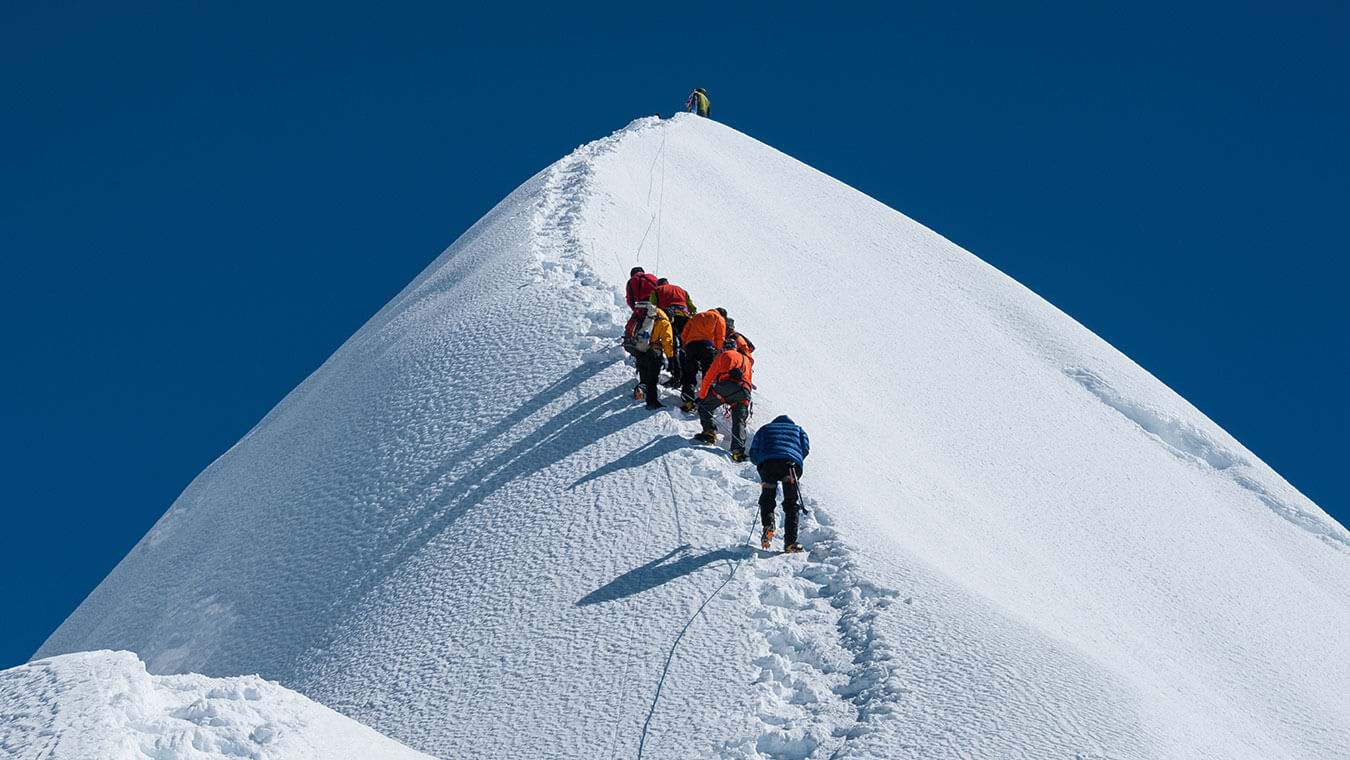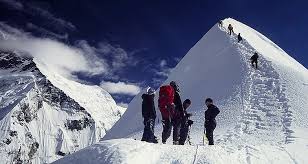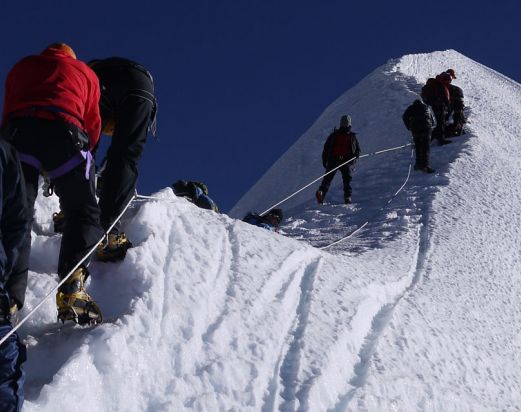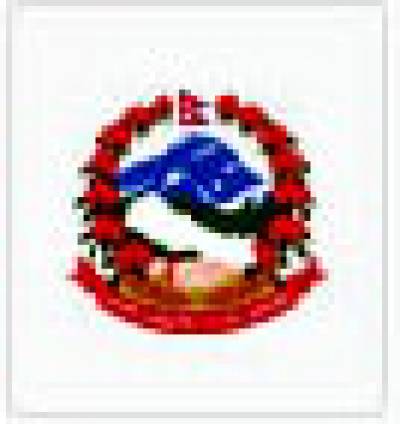ISLAND PEAK CLIMBING
Sherpa Expedition & Trekking (Est.1977) are pleased to announce FOR ADVENTURERS the most awesome, exhilarating & unforgettable climbing and treks on offer anywhere today!
Island Peak, also known as Imja Tse, stands as one of the most iconic trekking peaks in Nepal. Situated in the Everest region, it reaches an elevation of 6,189 meters (20,305 feet), offering climbers a challenging yet rewarding experience. The peak’s name derives from its appearance when viewed from Dingboche—a small island rising from a sea of ice.
The journey to Island Peak begins with a trek through the stunning Khumbu Valley, where climbers pass through traditional Sherpa villages and lush forests before reaching the alpine landscape. The trek is as much a cultural exploration as it is a physical challenge, with opportunities to visit ancient monasteries and experience the vibrant local traditions.
Reaching the base camp of Island Peak is a significant achievement in itself, but the true test lies in the ascent. The climb involves a mix of technical skills, including the use of ice axes and crampons, and navigating steep, snowy slopes. The summit push requires both physical endurance and mental fortitude, but the panoramic views of the surrounding peaks, including Everest, Lhotse, and Makalu, make the effort worthwhile.
Island Peak climbing is not just about reaching the summit; it’s about immersing oneself in the breathtaking beauty of the Himalayas, embracing the challenge, and experiencing the camaraderie of fellow adventurers. For many, it’s a life-changing journey that combines adventure, culture, and personal achievement.
Key Features & highlights of climbing Island Peak
- The Island Peak climb at an altitude of 6189m in the famous Khumbu region.
- Amazing, mountain views from Island Peak Summit.
- View expansive areas of glaciers, ice, and in-your-face mountain peaks.
- Use professional equipment such as crampons and karabiners.
- Gain experience in a ‘real’ mountain climbing environment.
- A unique adventure and experience of camping at Island Peak Base camp.
- Safe and hygienic food.
- Climbing to Kalapathar's amazing viewpoint at the base of Mt. Everest.
ITINERARY
Day 1 : Arrival at Kathmandu & transfer to hotel.
From the time you arrive in Kathmandu, the capital and cultural city of Nepal, we will be there at the airport to greet you and take you to your hotel. After arriving at the hotel you will have time to explore Thamel and buy any necessities you require for your trek.
Day 2 : Fly to Lukla (2,800m/9,184ft) then trek to Phakding (2,652m/8,700ft) Duration: 4-5 hours.
After a short morning flight to Lukla, you will be introduced to your guide and porter. We begin our trek with an easy walk through Chaurikharka village and descend to Dudhkoshi Ghat (2,530m/8,300ft). We follow the trail along the bank of the Dudh Koshi River until Phakding (2,652m/8,700ft), where we stay the night and acclimatize. With some free time, you can explore Phakding, a very popular stopping point along the way. NOTE: Lukla flights depart and return to Ramechhap instead of Kathmandu due to ongoing upgrades at Kathmandu Airport. Ramechhap is about a 4-hour drive from Kathmandu, so we will head for the airport at about 2 a.m. Similarly, the return drive at the end of the trek is between 4 to 6 hours depending on traffic.
Day 3 : Trek from Phakding to Namche Bazaar (3,440m/11,283ft) Duration: 5-6 hours.
A relatively easy walk through Monjo goes through pine trees offering glimpses of distant snow-covered peaks with spectacular views of waterfalls and yaks carrying trekking luggage. At Monjo, local authorities will check you have the necessary permits, such as TIMS cards and Park entry fee receipt. Your guide will take care of the paperwork which will give you time to stroll around and take in the sights. We will then enter the Sagarmatha Park and ascend a relatively steep trail finally arriving at Monjo where we will stop for lunch. After lunch, we continue our trek through forests and paths cross a watercourse via a high bridge. Once over the bridge, we continue our upward climb towards Namche and then have a long ascent to Namche Ukalo (steps). We continue uphill until when you reach Namche where you will be excited to get your first glimpse of Mt. Everest. Tonight you will stay at a lodge where all meals are included i.e. breakfast, lunch, and dinner.
Day 4 : Rest day at Namche Bazaar for acclimatization .
Health specialists recommend that, even on a rest day, we stay active and move around in order to help in acclimatization. This is an ideal opportunity to experience the culture of Namche’s village and take in the views of construction projects on Everest. An interesting place to visit in Namche is its native flora and fauna exhibition of the region. It is an option for trekkers to hike to Khumjung village (5-6 hours) where you can visit the mountaineer college. In the evening you can also visit the night bazaar at Namche. . Included meals - breakfast, lunch, and dinner.
Day 5 : Trek from Namche Bazaar to Tengboche (3,870m/12,694ft) Duration: 5-6 hours.
After breakfast, we will head off and trek to Tengboche via Phunki – a relatively easy climb. Tengboche Monastery is one of the most famous Buddhist monasteries in Nepal and the Khumbu region. Here you can enjoy the traditional blessing from the monks before your climb to the Sagarmatha Park and get to see the Scientific and Cultural Organization World Heritage electronic computer and a 360-degree view of the Himalayas including Mt. Everest, Nuptse, Lhotse, Ama Dablam, and Thamserku. The Tengboche Monastery opens at 3:00 pm, and if luck is on our side we will get to witness a brilliant spiritual ceremony We will stay the night at Tengboche with all meals included i.e. breakfast, lunch & dinner.
Day 6 : Trek from Tengboche to Dingboche (4,460m) Duration: 5-6 hours.
The trek from Tengboche to Dingboche is only a short distance which we will most likely complete in the afternoon. The last hill into Dingboche, and at this high altitude, is challenging!. The trail then heads to the village of Somare (4020m) and then to Orsho, both of which have lodged. Later the trail divides, with the left trail heading up to Pheriche before crossing a suspension bridge and a steep climb to the village of Dingboche (4460m) with many good guesthouses. Breakfast, lunch & dinner included.
Day 7 : Acclimatization day at Dingboche and hike to Chukkung Valley (4730m) Duration: 4-5 hours.
It is sensible to spend another day acclimatizing before heading to higher altitudes. One way of doing this is to hike up to Chukkung Valley (4730m) and on to Island Peak (Imja Tes). Above Dingboche is Nagkartshang Gompa (a strenuous trek takes around 2 to 3 hours), or alternatively head to Pheriche for an afternoon lecture on altitude sickness. The trail to Chhukung leaves Dingboche heading to Bibr (4570m) and is surrounded by fabulous mountain Peaks: Taboche, Nuptse, Lhotse, the enormous flute-shaped pass of Amphu Laptsa Pass, Ama Dablam. Chukkung has several lodges and is the most popular spot for those climbing Island Peak. If trekkers feel better acclimatized they can head up a grassy slope towards the peak of Chukkung Ri (5550m) for a magnificent view of Makalu. Breakfast, lunch & dinner included.
Day 8 : Trek From Dingboche to Lobuche (4,900 meters) Duration: 5-6 hours.
After breakfast, our trek starts with an easy walk towards Thukla before crossing the steep terminal moraine of the Khumbu Glacier and then passing through the boulder-strewn slopes as we ascend Chupki Lhara where we find clusters of stones with prayer flags placed by Sherpas as a memorial to Scott Fischer (American mountaineer), 10-time Everest summiteer Babu Chiri Sherpa (Nepalese Sherpa mountain guide) who perished on a mission to climb Mt. Everest. The path then continues to the Khumbu Glacier moraine and before us are many beautiful mountain peaks - Khumbutse, Lingtren, and Mahalangur Himal. We stay overnight in Lobuche. Breakfast,lunch & dinner included.
Day 9 : Trek to Gorak shep (5,180m) trek to EBC & overnight stay at Gorekshep Duration: 7-8 hours.
We commence our trek to Mt. Everest Base Camp through the vast Gorak-Shep. Along the trail, we pass the Indian army mountaineers' memorials. At this point the path can be confusing, so following your guide is important. The thin air at this high altitude can be exhausting. We traverse rocky dunes, moraine, and streams before reaching the Mt. Everest Base Camp. From Everest Base Camp you will see some of the world’s highest peaks, in stark contrast to the gray surroundings - especially in the spring. Before we are Khumbuste, Nuptse, and Pumori. We will then head back to Gorak Shep. Breakfast Lunch & Dinner Included.
Day 10 : Hike to Kalapatthar (5,550m) at sunrise & trek to Lobuche (4,900 m) Duration: 7-9 hours.
At around 4 a.m. in the pre-dawn darkness and cold temperatures (-10 to -14 C) we begin our trek. It is common for there to be cold winds at this altitude. Towering peaks, such as Khumbutse, Lingtren, and Changtse loom before us to the east as Everest comes into view. Not until we reach Kala Patthar (5550m) do we get a 360 degree up-close and bird’s eye view of Mount Everest. After taking in the panoramic views and madly clicking cameras we will return back to Lobuchefor a good night's rest. Breakfast, lunch & dinner included.
Day 11 : Trek from Lobuche to Kongma La (5,535m/18,159ft) to Chhukung (4,730m/15,518ft) Duration: 7-8 hours.
Once again, after breakfast, we trek via Khumbu through ice masses to Kongma La Base Camp at (5,000m/16,404ft). This section of our ascent to Kongma La pass is probably the most difficult part of our trek. Along the way there are many rock cairns draped in prayer flags marking the pass. On our decent we trek through Imja Khola where water from the slopes of Everest collect. After passing through this valley we descend to Chhukung a quaint summer settlement. After reaching Chhukung your guide will check his instruments and our equipment before our final climb to Chhukung. Instead of taking the route through Kongma La pass we may take an alternative route via Dingboche to Chhukung. Meals - breakfast, lunch & dinner.
Day 12 : Trek to Island Peak base camp (5,200m/17,060ft) Duration: 4-5 hours.
Although Island peak does not require technical expertise, it does however require strength and stamina. It does however require some basic skills and how to avoid mishaps. It is essential that we reach the summit before lunch, as in the afternoon it can be extremely windy. The path climbs hundreds of meters from the bottom camp before facing a sharp incline initially on a sandy trail before turning to grass, and finally over boulders. The path eventually narrows before entering a steep rock vale (narrow channel of rock). We finally, after many steps across and through the vale emerge on the other side Your guide, for safety reasons, may fix a rope to each climber to assist in climbing the final snowy slope to the ridge at the summit. The rope may often extend to 350m depending on the season and danger of crevices. Some of these crevices may be 2 to 3 meters across requiring the use of ladders. Once at the summit it is time to take out your camera and capture the magnificent views and get your breath back!. We will then descent to Island Peak Base Camp, and with your guides, will celebrate our success. Meals - breakfast, lunch & dinner.
Day 13 : Island Peak base Camp to Summit Island Peak summit (6,189m/20,305ft), back to Chhukung Duration: 10-12 hours.
Although Island peak does not require technical expertise, it does however require strength and stamina. It does however require some basic skills and how to avoid mishaps. It is essential that we reach the summit before lunch, as in the afternoon it can be extremely windy. The path climbs hundreds of meters from the bottom camp before facing a sharp incline initially on a sandy trail before turning to grass, and finally over boulders. The path eventually narrows before entering a steep rock vale (narrow channel of rock). We finally, after many steps across and through the vale emerge on the other side Your guide, for safety reasons, may fix a rope to each climber to assist in climbing the final snowy slope to the ridge at the summit. The rope may often extend to 350m depending on the season and danger of crevices. Some of these crevices may be 2 to 3 meters across requiring the use of ladders. Once at the summit it is time to take out your camera and capture the magnificent views and get your breath back!. We will then descent to Chhukung, and with your guides, will celebrate our success.
Day 14 : Trek from Chhukung to Namche Bazaar (3,440m/11,286ft) Duration: 6-7 hours.
Leaving Chhukung we return on the same path to Imja Khola heading up through the forest to Tengboche. If there is enough interest we can visit the nuns at their Tengboche residence. After lunch at Tengboche we descend along a path surrounded by alpine bush and juniper trees. After crossing the bridge over the Dudh Koshi watercourse, our path takes us to Dudh Koshi Gorge taking us through pine forests before finally reaching Sansa. On the way down we should keep our eyes peeled for glimpses of mountain goats, snow leopards, colorful pheasants, and other wildlife. After emerging from the forest we pass through Chorten before reaching the military camp at Namche Bazaar. Tonight we stay at Namche Bazaar.
Day 15 : Trek from Namche Bazaar to Lukla (2,800m/9,186ft) Duration: 6-7 hours.
The rocky path down is steep and it is advised to be cautious crossing this rocky landscape. We eventually cross the suspension bridges over the rapid flowing Dudh Koshi and its tributaries, where the path becomes flatter and easier to negotiate. After our arrival in Lukla we can stretch our aching legs and blissfully recall the exhilarating experiences of the last few weeks. Meals - breakfast, lunch & dinner.
Day 16 : Fly back to Kathmandu (1,350m/4,428ft).
Today we take a morning flight to Kathmandu. In Kathmandu, we can reminisce and can shop for souvenirs. Our guides will steer you in the right direction and where to find some bargains!
Day 17 : Final Departure from Kathmandu
Your journey in Nepal involves an Associate in the trip finish today! there's nothing to try to however trade emails together with your travel companions and organize your photos. A representative from Sherpa Expedition and Trekking can take you to the airdrome, about three hours before your regular flight. On your means home, you'll need much time to set up your next journey within the marvelous country of Nepal.
SERVICES
Costs included in your package.
- Airport picks up and transports by private Car/Jeep.
- Two night’s standard twin sharing Hotel in Kathmandu with breakfast.
- Three meals a day (Breakfast, lunch, and dinner) during the trek.
- Fresh fruit every evening after dinner.
- Trekking Lodge (Tea House) during the trek and tent camp accommodation during climbing session.
- All necessary paperwork including Sagarmatha National Park Entry Permit & Khumbu Pasang Lhamu Rural Municipality fees.
- Kathmandu-Lukla-Kathmandu (Ramechhap -Lukla- Ramechhap) flight with private airport transfer and domestic airport tax.
- A highly experienced, helpful, knowledgeable, friendly, English speaking well trained, Government license holder guide with all his salary, food, drinks, accommodation, transport and insurance.
- Climbing permit of Island Peak.
- Strong, helpful Sherpa porters with proper safety equipment and walking equipment, his salary, food, accommodation, and insurance (one porter for two people).
- Comprehensive medical supplies (first aid kit will be available).
- Arrangement of emergency helicopter service (paid by your Travel Insurance Company).
- Use of sleeping bag, down jacket, duffel bag and walking poles (if you don’t have your own, to be returned after trip completed).
- Sherpa Expedition and Trekking T-shirt
- Government taxes and official expenses.
- Trip achievement certificate after successful trip completion.
- Oxygen meter to check your pulse and oxygen saturation and heart rate twice daily (Very useful to check Altitude Mountain Sickness(AMS) symptoms) which will ensure your health during the trek.
- Assistant guide for groups of 8 or more people.
Costs Exclude
- Meals whilst you are in Kathmandu - lunch, and dinner.
- Nepal entry visa fee (easy to obtain the visa on arrival at Tribhuvan International Airport – Kathmandu). $30 USD for 15-day, $50 USD for 30 Days, and $125 USD for 90 Days visa.
- Personal travel and medical insurance.
- International airfare.
- Your personal expenses.
- All the alcoholic and nonalcoholic, soup, tea, coffee, hot chocolate, cocoa, mineral water, extra food, cold and hot drinks on trek ( i.e. those you choose to purchase along the way and during evenings in the tea houses)
- All desserts & sweet things like chocolate, cake, pie, pudding.
- Hot shower and battery charging at the tea houses.
- Tips for the guide, porter, and driver (tipping is expected)
- Excess baggage of more than 10 kg for Lukla flight.
- NOTE: If you return earlier from the trek due to sickness or any problem, the money you paid for the flight, hotel, mountain room, food, etc. is nonrefundable, and you will need to bear the expenses for the hotel, food, etc. in Kathmandu yourself.
EQUIPMENTS
You will be carrying all of your gear and share some of the cluster gear. Keeping your pack light is important, so choose light-weight clothing and equipment. Be sure to have a range of clothing suitable for all conditions. Sudden change of weather may require layering of clothing. Three layers will meet your needs. Avoid cotton or fabrics that do not maintain heat when cold. Comfortable durable wool (or proven fabrics) that breathe and expel sweat lends itself to an additional pleasant experience!'
We will offer complimentary water and a windproof duffle that you'll use on the trek - carried by porters. The duffle is yours to keep once at the end of the trek. You can safely leave your bag, together with your non-trekking requirements, at our office in Katmandu and collect them upon your return.
All equipment, such as base camp tents, room accessories, climbing rope, ice screws, snow bar and ice hammer is provided by Sherpa Expedition & Trekking.
Upper Body:
- Base Layers: Moisture-wicking and quick-drying shirts and thermal tops.
- Insulation Layers: Fleece or down jackets to provide warmth.
- Waterproof Shell Jacket: A durable and breathable jacket to protect against wind and rain.
- Softshell Jacket: A lightweight and water-resistant jacket for added protection.
- Climbing Harness: A comfortable harness to secure yourself to the rope.
- Helmet: A strong and well-fitting helmet to protect your head from falling objects.
- Gloves: A combination of lightweight liner gloves and insulated gloves or mittens for warmth and dexterity.
- Buff or Neck Gaiter: To protect your neck and face from cold and wind.
- Sunglasses: Polarized and UV-protected sunglasses to shield your eyes from the sun and snow glare.
- Goggles: Ski or mountaineering goggles for added eye protection in extreme weather conditions.
Lower Body:
- Base Layers: Moisture-wicking and quick-drying thermal bottoms.
- Insulation Layers: Fleece or insulated pants for added warmth.
- Waterproof Shell Pants: Durable and breathable pants to protect against wind, rain, and snow.
- Softshell Pants: Lightweight and water-resistant pants for added protection.
- Mountaineering Boots: Sturdy and insulated boots designed for snow and ice.
- Crampons: Attachable spikes that provide traction on icy terrain.
- Gaiters: Waterproof and breathable gaiters to keep snow out of your boots.
- Socks: A combination of moisture-wicking liner socks and thick, warm mountaineering socks.
Other Essential Items:
- Backpack: A spacious and sturdy backpack to carry your climbing gear and personal belongings.
- Sleeping Bag: A warm and lightweight sleeping bag that can withstand sub-zero temperatures.
- Trekking Poles: Adjustable trekking poles for added stability and support.
- Headlamp: Essential for climbing in low-light or dark conditions.
- Water Bottles: Insulated water bottles to keep your water from freezing.
- Sunscreen: High SPF sunscreen to protect your skin from the strong sun at high altitudes.
- First Aid Kit: A comprehensive first aid kit with essential medications and supplies.
- Climbing Snacks: Energy bars, nuts, and other lightweight snacks for quick fuel during the climb.
It is important to invest in high-quality gear and ensure that everything fits properly and is in good condition. Additionally, consult with experienced climbers or a professional guide to ensure you have all the necessary gear and receive proper training on how to use it effectively and safely.
GOOD TO KNOW
If you are considering climbing Island Peak, here are some important things to know:
1. Island Peak, also known as Imja Tse, is located in the Everest region of Nepal. It stands at an elevation of 6,189 meters (20,305 feet) and is a popular climbing destination for mountaineers.
2. Prior climbing experience is recommended as Island Peak is a technical climb. Basic mountaineering skills such as using crampons, ice axe, and rope techniques are necessary.
3. Acclimatization is crucial due to the high altitude. It is advisable to spend a few days in the Everest region, acclimatizing and trekking to higher altitudes before attempting the climb.
4. A climbing permit is required to climb Island Peak. This can be obtained through a registered trekking agency in Nepal. Make sure to check the latest permit regulations and fees.
5. Hiring a local guide or joining a guided expedition is highly recommended. They have the expertise, knowledge of the route, and can provide support and safety during the climb.
6. The best time to climb Island Peak is during the pre-monsoon (spring) season (April to May) and post-monsoon (autumn) season (September to November). These months generally have more stable weather conditions and clear views.
7. Proper gear and equipment are essential for a safe and successful climb. This includes mountaineering boots, crampons, ice axe, climbing harness, helmet, layers of warm clothing, gloves, and other necessary climbing gear.
8. Physical fitness and endurance are important for climbing Island Peak. Regular exercise, cardiovascular training, and strength-building activities are recommended to prepare your body for the physical demands of the climb.
9. It is important to be aware of altitude sickness and its symptoms. Take necessary precautions, such as proper acclimatization, staying hydrated, and following the guidance of your guide.
10. Respect the local culture and environment. Island Peak is located in Sagarmatha National Park, a UNESCO World Heritage Site. Follow the Leave No Trace principles, adhere to local customs, and be mindful of the fragile mountain ecosystem.
Always prioritize safety and consult with experienced climbers or professional guides for further information and guidance specific to your Island Peak climbing expedition.
MAP
PHOTOS/Videos
Departures
Select a departure month
Fill out the form below and a Travel Expert will reach out to create your perfect tour.
FAQS
How difficult is it to climb Island Peak?
Island Peak is considered a moderately difficult climb. It requires basic mountaineering skills, including using crampons, ice axe, and rope techniques. Prior climbing experience and physical fitness are recommended.
Do I need a climbing permit for Island Peak?
Yes, a climbing permit is required to climb Island Peak. It can be obtained through a registered trekking agency in Nepal. The permit fees vary depending on the season and nationality.
Can I climb Island Peak without a guide?
While it is possible to climb Island Peak without a guide, it is highly recommended to hire a local guide or join a guided expedition. They have the knowledge, experience, and can ensure your safety during the climb.
What is the best time to climb Island Peak?
The best time to climb Island Peak is during the pre-monsoon (spring) season (April to May) and post-monsoon (autumn) season (September to November). These months generally have more stable weather conditions and clear views.
How long does it take to climb Island Peak?
The duration of the climb can vary depending on several factors, including your fitness level and acclimatization. Typically, it takes around 3 weeks for a complete Island Peak climbing expedition, including trekking to and from the base camp.
What permits do I need for climbing Island Peak?
In addition to the climbing permit, you also need a Sagarmatha National Park entry permit and a TIMS (Trekkers' Information Management System) card. These permits can be obtained through the trekking agency.
Is altitude sickness a concern on Island Peak?
Yes, altitude sickness is a concern when climbing Island Peak due to the high elevation. Proper acclimatization, staying hydrated, and following the guidance of your guide are essential to minimize the risk.
What gear do I need for climbing Island Peak?
You will need mountaineering boots, crampons, ice axe, climbing harness, helmet, layers of warm clothing, gloves, and other necessary climbing gear. It is important to have proper gear and equipment for a safe and successful climb.
Is previous climbing experience required for Island Peak?
While previous climbing experience is not mandatory, it is highly recommended to have some basic mountaineering skills and experience with high-altitude trekking to ensure a safer and more enjoyable climb.
Can I rent climbing gear in Nepal?
Yes, you can rent climbing gear in Nepal. Kathmandu and Lukla are common places to find gear rental shops. However, it is advisable to bring your own personal gear and rent only the equipment you don't have or can't bring with you.
Latest Traveller’s Reviews
Travel experiences of our clients who recently returned from their trips.
100%
Based On 64 Reviews
Randy Mcnamer
Austria
April 25, 2024
Island Peak Climb
Climbing Island Peak with Sherpa Expedition was an incredible adventure that I will cherish forever. The team's professionalism, dedication, and expertise were evident from the moment we started our journey. The guides were not only skilled mountaineers but also great motivators, pushing us to challenge ourselves and reach new heights. The logistics, accommodations, and meals provided by Sherpa Expedition were top-notch, ensuring our comfort and well-being throughout the expedition. Summiting Island Peak was a surreal experience, with panoramic views that took my breath away. I cannot recommend Sherpa Expedition enough for anyone looking to conquer Island Peak and create lifelong memories.
Denis Ferland
Estonia
April 2, 2024
Great Team
My experience climbing Island Peak with Sherpa Expedition was nothing short of extraordinary. The team's professionalism, expertise, and commitment to safety were evident throughout the expedition. The guides were knowledgeable and supportive, ensuring that each climber had the necessary skills and confidence to reach the summit. The views from the top of Island Peak were simply breathtaking, making all the hard work and preparation worth it. I highly recommend Sherpa Expedition for an unforgettable climbing experience.
Jeanna Polen
Denmark
March 13, 2024
Summit Island Peak
Embarking on the Island Peak climbing expedition with Sherpa Expedition was a decision I will never regret. The team's attention to detail, excellent organization, and experienced guides made the journey seamless and enjoyable. From the first day of training to the final push to the summit, I felt supported and encouraged every step of the way. The camaraderie among the climbers and the breathtaking scenery made this adventure truly unforgettable. Thank you, Sherpa Expedition, for an incredible experience that exceeded all expectations.
People Considering This Package Right Now Check availability



























